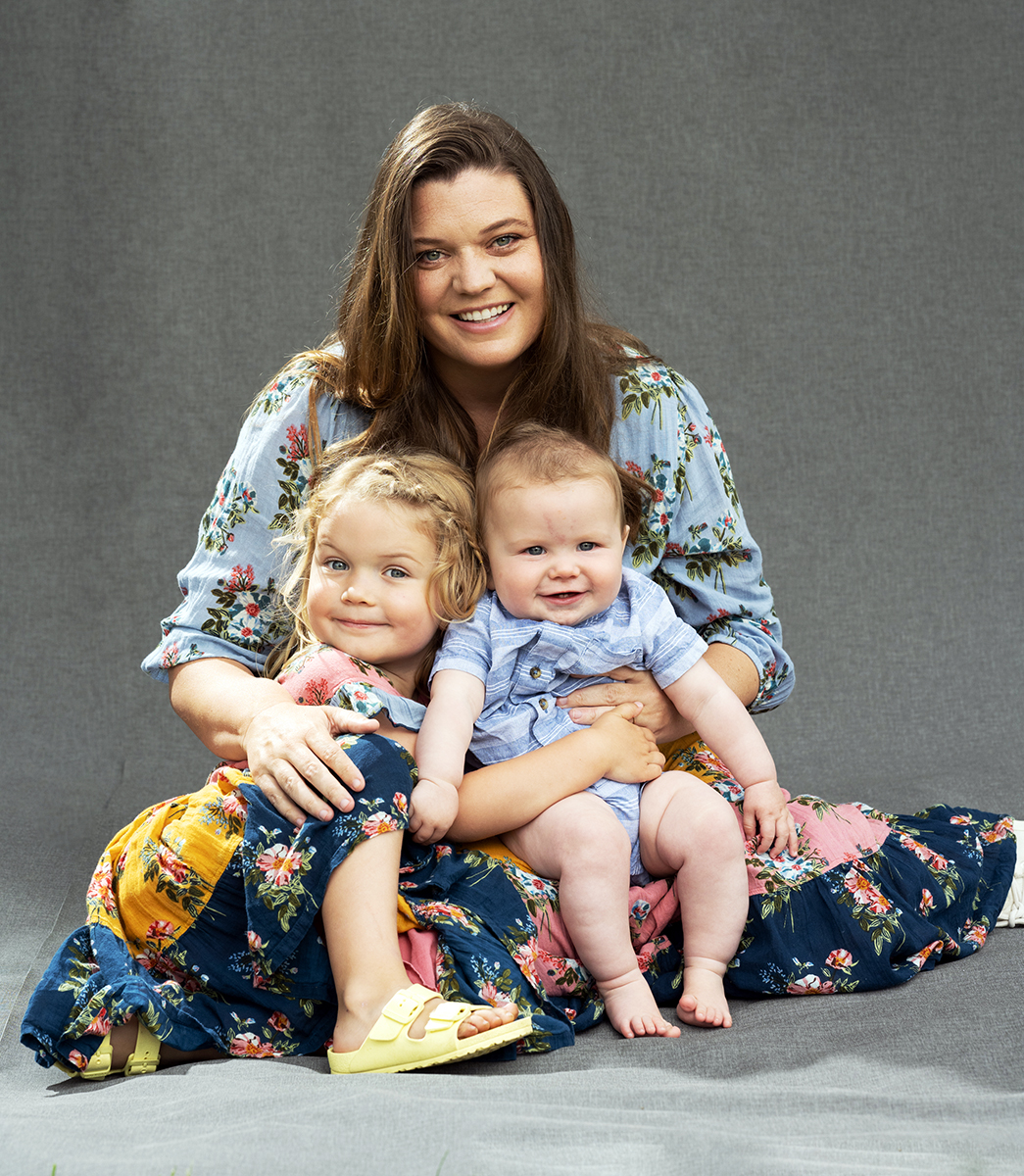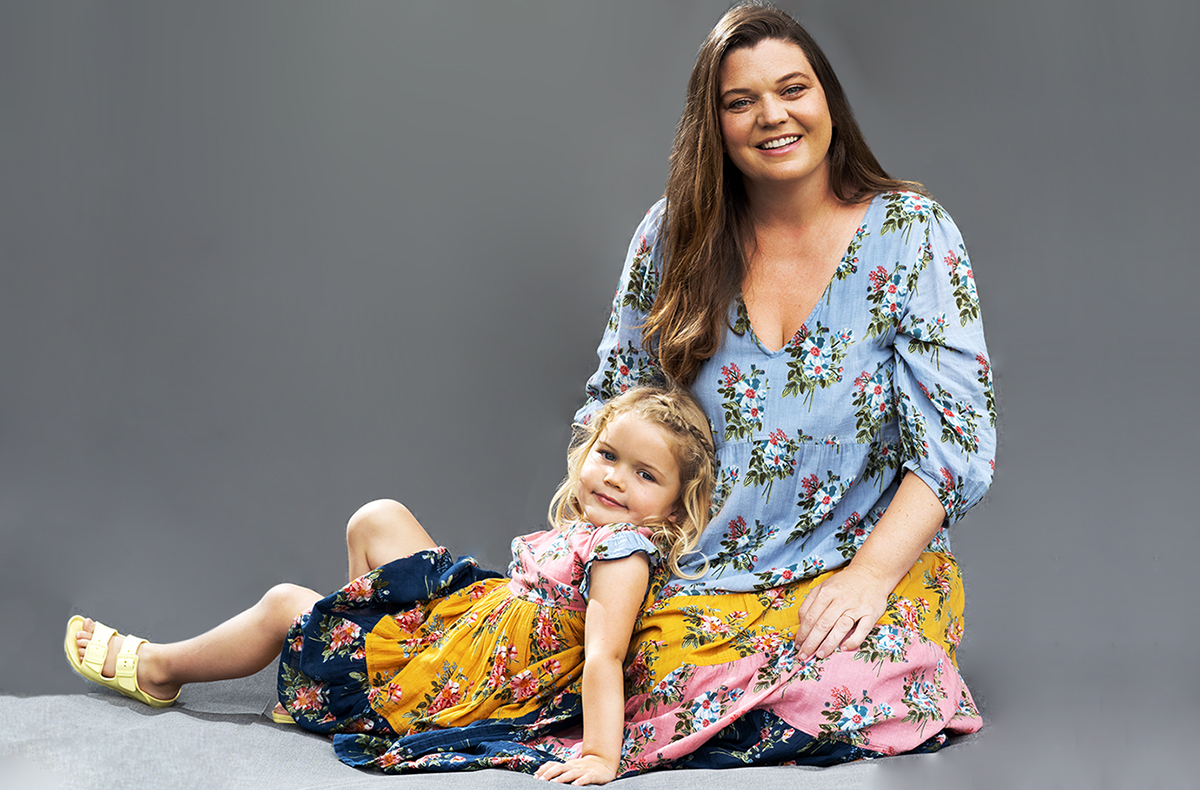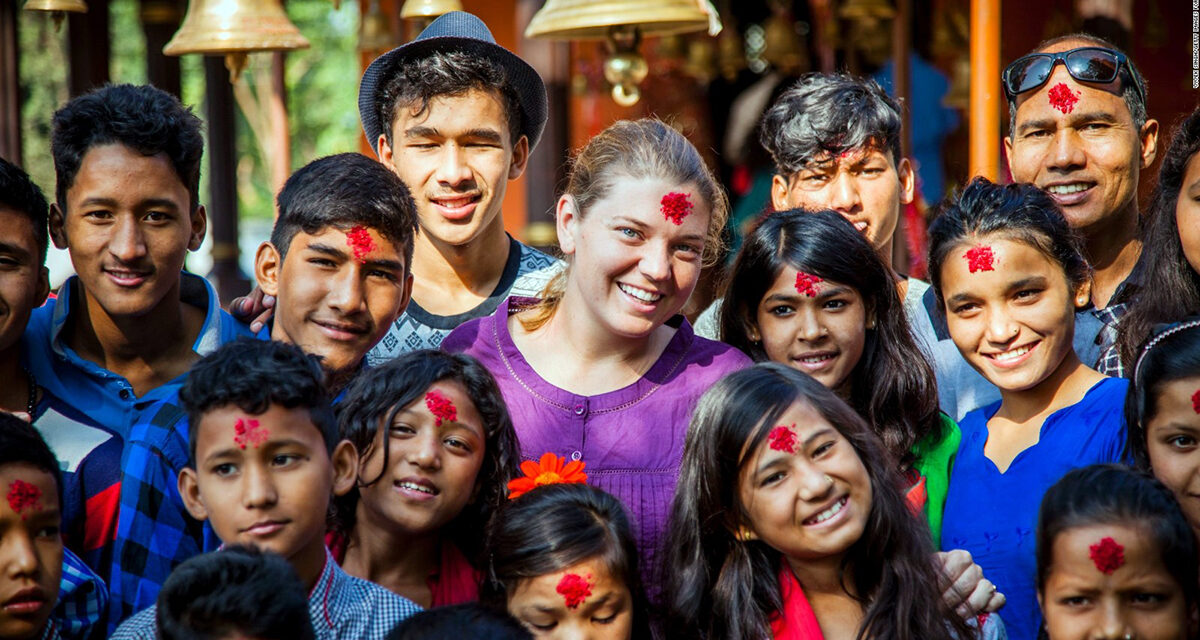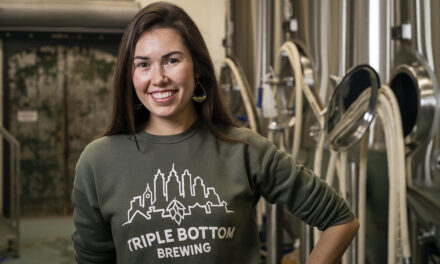Confronted with startling inequality thousands of miles from home, one New Jersey teen couldn’t turn away. Maggie Doyne, now 35, co-leads a non-profit in Nepal that provides a home for nearly 50 children, a school for more than 450 students, and a community center dedicated to empowering women and girls.
How can a simple greeting change your life—and the lives of hundreds of others?
Maggie Doyne was just 19 years old—and more than 7,500 miles from her home in New Jersey—when she came upon a little girl in a bright orange dress breaking rocks in a riverbed in the foothills of the Himalayas in midwestern Nepal. The sight stopped Doyne in her tracks.
The earnest teenager from New Jersey was nearing the end of an extended gap year. She’d helped build a seawall in the South Pacific, attended a silent retreat at a Buddhist monastery, gotten her belly button pierced, and learned to surf in Australia.
She’d spent her final few months of her official gap-year program in India working at a children’s home and school, where she met many refugees from Nepal, which was then emerging from years of civil war. Doyne was supposed to stay at the home in India for a few months; she ended up staying another year. The choice hinted at her future.
On the day her life changed forever, Doyne stood on the banks of a riverbed in Surkhet, “one of the poorest corners of one of the poorest parts of the world,” she’d later write, watching as women and young children, some who seemed as young as 3, wandered up and down, looking for rocks to crush into pebbles to sell to construction projects. The little girl in a stained orange party dress whacked a rock over and over, “grunting like a quarryman.” She noticed Doyne and stood up, waving and shouting and smiling a huge grin.
“Namaste, didi!” the little girl shouted. (Hello, big sister.)
Doyne asked herself, What am I supposed to do in this moment, in this life? What does help look like? How do I turn my back on this?
Improbable as it may seem now, that chance encounter in a riverbed would lead over the next 15-plus years to a community compound that includes a loving home for more than 60 orphans, a world-class self-sustaining “green” school, and a women’s center dedicated to empowering girls and women with vocational skills to overcome social inequality. Though neither of the girls could imagine it at the time, the meeting would lead to both international recognition and devastating heartbreak.
“The riverbed became a force in my imagination,” Doyne says today. “I thought to myself, One day I’m going to walk across this and not see any children there.”
On that fateful day in 2006, Doyne replied to the little girl in the bright orange dress: “Namaste.” Hello, future.
Access to education is an equalizer. I felt it in my bones, if a child lives with love and family and has the basic needs met, the whole trajectory of the world changes.

Maggie and her two children, Ruby Sunshine and Everest
Book Smart
In Nepal at night, Maggie read by candlelight to educate—and entertain—herself. These were some of her favorites
• Healing Trauma: Attachment, Mind, Body and Brain, edited by Daniel Siegel and Marion Solomon
• The Prophet, by Kahlil Gibran
• The End of Poverty: Economic Possibilities for Our Time, by Jeffrey Sachs
• The White Man’s Burden: Why the West’s Efforts to Aid the Rest Have Done So Much Ill and So Little Good, by William Easterly
• The Bottom Billion: Why the Poorest Countries Are Failing and What Can Be Done About It, by Paul Collier
• Pathologies of Power: Health, Human Rights, and the New War on the Poor, by Paul Farmer
• What Color Is Your Parachute? by Richard N. Bolles
• Who Moved My Cheese? by Spencer Johnson
• Mother Teresa: In My Own Words, by Mother Teresa
• Eat Pray Love, by Elizabeth Gilbert
• Wild, by Cheryl Strayed
• Harry Potter, by J. K. Rowling
• The Hunger Games, by Suzanne Collins
• The Vampire Diaries, by L.J. Smith
Humanity has done harder things than create a world that will be better for children. I’m choosing to be optimistic about the future.

Strong Foundation
“Doyne was the babysitter everyone wanted,” says Trish Hall, a Doyne family friend and the director of the Mendham Borough Library, in New Jersey. “She was hard to get!”
Hall is introducing Doyne to a packed room gathered in May to hear about her new memoir, Between the Mountain and the Sky: A Mother’s Story of Love, Loss, Healing, and Hope. Some of those gathered are the parents of the children she babysat; some are the kids all grown up now.
Her family moved when she was a tween from a rental in Moorestown to a five-bedroom on a cul-de-sac in Mendham, NJ. Their idyllic 2-acre lot, with an oversized trampoline, abutted a brook and the multi-use 55-mile Patriot’s Path. Doyne’s type A mother was a real estate agent, her father a stay-at-home dad who worked at a health-food store, meditated, and kept a small Buddha on the mantel. Doyne describes her hometown as “radically quaint.”
Mendham may lie thousands of miles from Surkhet, Nepal—literally and figuratively—but Doyne credits her upbringing with instilling the confidence and competence she leaned on to become an empathetic change-maker. “This was a safe community, full of love and kindness, and I am so grateful,” Doyne tells the 100 or so (mostly women) who’ve come to hear her speak. “I sought to emulate that. Once you’re given a happy childhood, you can pay that forward.”
After crossing paths with the little rock-breaking girl in the riverbed in Nepal, Doyne went to the only Internet café in Surkhet and discovered sobering facts: there were 1 million orphaned children in Nepal at the time; only 50 percent of women over age 6 had ever attended school; nearly 60 percent of people in the region were living in poverty. She learned that sending a daughter to school often meant losing a family’s source of income.
Doyne was already sensitive to the perils of being “the overeager white kid building the wall that the locals could have built. Colonialism with a good heart is still colonialism.” She wanted to help the little girl get out of the river, “but only if that’s what she wants and if that’s what help really is.”
The next day Doyne and a Nepali friend as translator asked the little girl her name and if she’d like to go to school. “Yes!” Hima squealed; her single mother was equally enthusiastic. Within 2 weeks, Hima left the riverbed for her first day of school. Within days, Doyne paid several other children’s tuition as well.
Still, it didn’t feel like enough. There were so many children who needed care. “Access to education is an equalizer,” Doyne tells the audience in Mendham. “I felt in my bones, if a child lives with love and family and their basic needs met, the whole trajectory of the world changes.”
Doyne called her parents back home and said, “I need you to get $5,000 out of my savings account and send it to me as soon as possible. I’m going to buy a piece of property in Surkhet and build a home for children.”
Doing Something
With her $5,000 in babysitting money, Doyne and Tope Malla, a Nepali refugee who would become the cofounder of their organization, bought a small parcel of land. They named it Kopila Valley—kopila means “bud” in Nepalese. After breaking ground for the home, Doyne returned to the States to raise much-needed funds. She babysat nearly every day of the summer, sending all the money back to Malla, who was overseeing construction. She staged a community-wide garage sale that netted $2,227 and caught the attention of the local newspaper, which in turn made an impression on generous contributors who donated time, talent, and treasure. Doyne decided to call her nonprofit organization BlinkNow, in recognition of both how quickly her life changed and how quickly a child’s life can be transformed.
When the first floor of the Kopila Valley home was finished in 2008, they took in their first orphan, a 5-year-old girl named Nisha. Next a pair of siblings arrived. And then another child, and another. Soon the home was filled with 20 kids and many caretakers, including Malla, and his wife, Kusum, and other Nepali “aunties” and “uncles,” terms of respect used for all community grown-ups.
“Loving children is easy,” Doyne writes in her memoir. “Caring for them is harder than anything I could have imagined.” The kids marveled over electricity, flicking the lights on and off; they distrusted the toilets; they dropped banana peels on the floor for the goats to eat (there were no indoor goats). The water was intermittent at best and oftentimes brown until they invested in a filter.
The world took notice of Kopila Valley and BlinkNow, which furthered the mission: When Doyne won the Cosmo Girl of the Year award in 2009, she endured the required Maybelline makeover with gratitude for the funds to expand the home and the number of children they cared for. In 2010, Doyne won the Do Something Award, which landed her photo on the back of bags of Cool Ranch Doritos and provided $100,000 to establish a school.
While economic growth has fueled postwar Nepal, access to education is still challenging. The adult literacy rate is just 60 percent, and 30 percent of kids drop out of school by the eighth grade. The Kopila Valley School aims to change that by offering a host of comprehensive services, including free education in both English and Nepali, with a diverse curriculum; nutritious meals; health and dental care; numerous after-school activities; and open doors from 7 in the morning until 6 at night for kids nursery-school age through 12th grade. Today, the school serves over 450 students and employs over 100 Nepali staff members.
What’s more, after 6 years of planning and construction, Kopila Valley School opened a new world-class Green Campus in 2019. The structure was built with 18-inch fire-resistant rammed-earth walls that stay cool in the summer and warm in the winter. Solar panels provide all the electricity the school needs. Rain harvested during the monsoon season goes through a purification system that makes it safe for washing hands and dishes and an additional filtration system to make it potable; gray water is used to flush toilets. The school includes outdoor classrooms, a farm, and a garden.
“The model for the school is, this is where you want your kids to go,” Doyne says. “Not the best in Nepal but the best anywhere.”
But for all the heartwarming successes, there have also been devastating heartbreaks. The team lost one girl in a UK hospital when her brain swelled after multiple surgeries to remove optic tumors. Another committed suicide, which, sadly, is not uncommon in Nepal—it has one of the highest rates in the world of suicide among women ages 10 to 24.
In a cruel twist of fate, Doyne accepted one of BlinkNow’s highest honors and suffered one of her darkest personal tragedies within 6 weeks at the end of 2015. In November, Anderson Cooper presented her with CNN’s prestigious Hero of the Year Award at a gala in New York City. In December, shortly after she returned to Surkhet, the youngest baby in the home perished in an accidental drowning. Ravi had come to Kopila Valley as a severely malnourished 2-month-old weighing just 3 pounds. With good medical care, Ravi thrived and grew closer to Doyne possibly more than any other child had, sleeping on her chest at night. After his shocking loss, Doyne sank into deep despair. Many in the community worried she might go back to the U.S. and never return to Surkhet. “Right away, I realized I needed professional help,” says Doyne. “I was a mother, I didn’t want it to be the end of our family. I had something to live for. I had family and children to get back to, so I wanted to get better for them.”
Doyne returned to New Jersey to begin her healing journey with the help of therapists, family members, and dear friends. “After the biggest loss of my life, I was promised I would find joy again,” she says. And she did, when months later she reconnected with a man she’d met years earlier, Jeremy Regimbal, a commercial filmmaker and documentarian. They bonded quickly, going on a road trip to the California desert with his dog, Bear. “Meeting Jeremy really helped, because he could be on that journey with me, and love is good,” Doyne says. “Just learning that I could trust love again.”
Doyne married Jeremy in Nepal in 2017. All the kids participated in the joyful and colorful ceremony, as flower girls, bridesmaids, and groomsmen. Doyne’s traditional red Nepali wedding dress strained across her pregnant belly. “At first, I was afraid I wouldn’t be able to love the baby as much as I loved Ravi,” Doyne writes in her memoir. “What scares me most now is that I will.” When Doyne gave birth in 2018 to her first biological child, she named her Ruby Sunshine.

Feeling the Impact
“I’m going to take a gap year.”
In a full-circle moment, this time it was Doyne on the receiving end of the conversation between parent and college-bound child. Nisha, the first adopted by the Kopila Valley home, had earned a full ride at Whitman College, in Walla Walla, Wash. Except she wanted to delay school and join Global Citizen Year.
It took Doyne by surprise because Nisha had always been so focused on academic success. “I don’t think I realized the impact of my own story,” she says.
The first cohort of Doyne’s children are now going to college and finding jobs—they are the age Doyne was when she first came to Nepal. Nisha, who spent her gap year in Senegal, is on track to graduate from Whitman in 2023. Hima, the little rock-breaker in the orange dress, completed the whole Kopila Valley School program and is now in college in Kathmandu, studying hospitality.
As it did the world over, the global pandemic disrupted life in Kopila Valley. In the early days, Jeremy, a Canadian citizen, was evacuated along with their daughter, Ruby. It took a few months for Doyne to join them near his parents on an island off of Vancouver. She had to quarantine for 14 days in Canada and used that time to begin plotting out her memoir. Soon thereafter, she became pregnant and gave birth to a boy, Everest, in November 2021. The family spent the first half of 2022 traveling between California, Washington, New Jersey, and the Netherlands, staying with family and friends and promoting Doyne’s memoir.
These 2 years have been the longest she’s ever spent away from Surkhet. By May, she was itching to get back to their “normal life” and to enroll Ruby Sunshine in kindergarten, dressing her in the school uniform of a gingham top and blue slacks.
Nepal is changing. Primary education enrollment is up to 97 percent, according to the Brookings Institution, with gender parity almost achieved; even so, only 20 percent of girls stick with school past 11th grade. “The aunties I work with say, ‘When I was a kid, none of the girls went to school,’” Doyne says. “Now you go to villages, and girls are in school.” Today there are no children laboring in the riverbed in Surkhet, just as Doyne had envisioned when she first came across the little rock-breaking girl in the orange dress. Hope springs eternal.
“Humanity has done harder things than create a world that will be better for children,” Doyne says. “I’m choosing to be optimistic about the future.”






